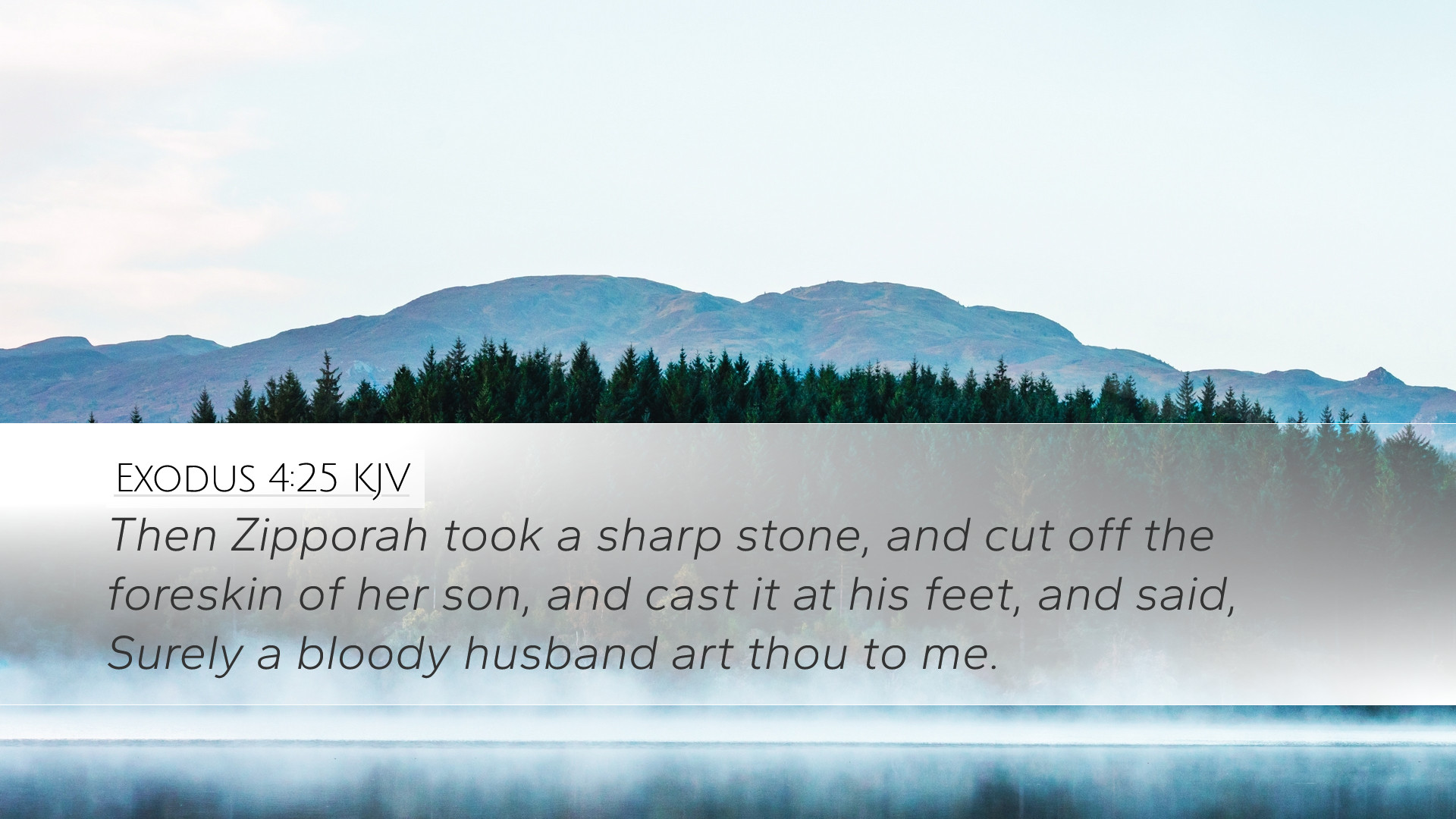Exodus 4:25 - Summary and Commentary
Verse: "Then Zipporah took a sharp stone, and cut off the foreskin of her son, and cast it at his feet, and said, Surely a bloody husband art thou to me." (Exodus 4:25)
Introduction
This account, although brief, contains significant theological and personal dimensions that have prompted various interpretations. It reflects on God’s covenant, obedience, and the seriousness of divine commands. We will explore its implications through the lens of prominent public domain commentaries.
Contextual Background
Exodus 4 describes God's commissioning of Moses and his subsequent journey back to Egypt. Verses leading up to 4:25 provide context regarding God’s covenant with Abraham and the importance of circumcision among the Israelites as a sign of that covenant.
Analysis of the Verse
- Zipporah's Action:
Matthew Henry notes that Zipporah's action of circumcising their son was driven by urgency, as God had sought to kill Moses for his neglect of this covenant obligation. This highlights the necessity of obedience to God's commandments, especially in family matters.
- The Symbolism of Blood:
Albert Barnes comments on the significance of blood in this act, connecting it to the sacrifices required under the law. The shedding of blood here symbolized both obedience and consecration, suggesting Zipporah recognized the seriousness of the covenant and aligned herself with God’s will for her family.
- Zipporah's Declaration:
Adam Clarke points out that Zipporah's mention of Moses as a "bloody husband" serves to express her distress over the act. It reveals cultural tensions and her struggle to understand the full implications of the covenant with Israel. Clarke argues that this moment encapsulates the clash between divine command and human relationships.
Theological Implications
The brief scene offers profound insights into several theological themes:
- Covenant Obedience:
The necessity of circumcision as a means of entering into the covenant with God underscores the importance of obedience. This act calls to attention the nature of God's expectations from His people, establishing the idea that one's standing with God requires compliance with His commands.
- Grace and Judgment:
The tension between grace and judgment is displayed vividly in this narrative. While God’s judgment is imminent due to Moses' disobedience, grace is simultaneously displayed through Zipporah's decisive action that averts catastrophe.
- Parental Responsibility:
This account emphasizes the responsibilities placed upon parents concerning the spiritual upbringing of their children. Zipporah's sudden engagement in fulfilling the covenantal duty reveals the critical role of parents in adhering to God's commands for the sake of their family.
Practical Applications for Today
For pastors, students, theologians, and Bible scholars, this passage serves as a reminder of the multifaceted nature of Scripture:
- Importance of Obedience:
The gravity of God's commands should resonate with contemporary readers, highlighting the need for obedience in various aspects of life, especially where relationships intersect with divine will.
- Understanding Cultural Context:
Examining the cultural dynamics at play can provide insights into how God's commands are perceived within different familial and societal structures, informing ministry approaches and pastoral care.
- Encouragement in Conflict:
The struggle depicted in the relationship between Moses and Zipporah invites reflection on how conflicts arising from spiritual obligations can be navigated with thoughtful and prayerful consideration.
Conclusion
Exodus 4:25, while a seemingly obscure verse, encompasses rich layers of meaning that remain relevant for today's believers. It invites deeper reflection on the nature of God's covenant, the weight of obedience, and the challenges faced within family dynamics regarding faith and practice. The commentaries of Matthew Henry, Albert Barnes, and Adam Clarke all contribute valuable insights that encourage a comprehensive understanding of the text and its implications for living a life that is pleasing to God.


